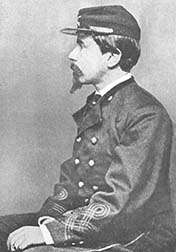The Life Story of Part II: The Civil War Years Page 3 Sketches from Henry's War Diary Henry kept a war diary during a month's period from April to May 1863, recording the regiment's activities prior to and during the days on which the Battle of Chancellorsville was fought. The following excerpts from three passages document the movements of their troops: April 29. ...We went on a mile or two thro' the woods, passed the scene of
the Kellysville fight, a beautiful field. Just as
we got there firing began, first carbines, then a
few shells. We formed, and got thro' another belt
of woods, then formed line on a huge field, where
also the former fight took place. It was just
dark, and in ten minutes we returned to the edge
of the woods, dismounted, and kept the squadrons
formed all night. We made very small fires
indeed, fed horses, and slept thro' a hard rain
all night.... On May 7, Higginson relayed pleasant news in a letter to his father: I received a letter from Bob Shaw, speaking of his wedding [(marriage to Annie Haggerty)], this afternoon.... Charley (Lowell) should be married too [to Shaw's sister, Josephine ("Effie")]; it is much better, for his wife might go to him while in winter quarters.... [Cousin] William Channing [of London] was here this afternoon, he having been on duty with the Sanitary [Commission] people here. [Brother] Jim is very well and happy; he has been in charge of a company for some three or four weeks.... Bob Shaw wrote to me about [our brother] Frank [who is now first lieutenant in Shaw's 54th Massachusetts regiment], speaking very well of him; he will get promoted faster there than in the 2d Cavalry.... The Battle of Aldie The following month, on June 17, 1863, the 1st Massachusetts Cavalry engaged in a fierce combat with the soldiers of General John Ewell Brown (JEB) Stuart and General FitzHugh Lee's cavalry at Aldie Gap. Higginson told his account of the Battle of Aldie in his reminiscences: It had been a hot, tiresome ride. The men came along in pretty good order, although one of the regiments belonging to another brigade galloped about to get water, and acted in a foolish way. Just as we came to the town of Aldie, we heard a little firing, and were ordered to the front. As we rode through the town, we saw a little fighting going on in front of us—a little charge by some men of another regiment. We turned to the right, went up by a little wood, and our regiment was put into a field close by a farmhouse and close by the road. There, Colonel Curtis, in command, left me with two squadrons, and went to attend to something else. I rode up to this farmhouse, and saw one or two soldiers' jackets hanging at the door, and was looking about, when I saw a regiment coming down at full tilt on the road towards us. I immediately ordered one squadron into the road and we charged these men. They turned straight around and ran away. We came very near their rear, but could not reach them. They went down a hill and at the top I ordered a halt. Captain [Lucius M.] Sargent, with two or three men, rode straight on down into a valley after a few of the troopers we had been pursuing, and began fighting them. I yelled to him to come back, but he would not do so, and fearing that he would get into trouble, I rode down to give him the order, when right behind us came a whole regiment of Confederate cavalry at full speed. I shouted to Sargent and the two or three men with him to ride for their lives, and we galloped up a hill in front of us, where we lost one man through the balking of his horse. We reached the top of the hill, and the Confederates had stopped, as we were not worth pursuing. Sargent turned around in his saddle and made faces at them with his fingers, whereat they pursued us, and we rode down another very steep hill, and at the bottom they caught us, and we had a little shindy. Sargent was knocked from his horse and shot, as he thought, just above the heart. One of our men was killed, and one lieutenant was shot through the side. In striking a man opposite to me, who was using improper language, I was knocked from my horse, and found myself in the road. Over me was standing a man whom I had unhorsed, and who struck at my head. He then proposed to take me prisoner, but I told him I should die in a few minutes, for I put my hand and found a hole in my backbone. He took what he could get of my goods, and rode off, leaving my horse, which had been shot with four bullets. (See Higginson Reminisces on the Aftermath of the Battle for the rest of the major's account.)
The Major and Mrs. Higginson Little did
Higginson or his doctors know, but his injuries
were far more critical than they realized. In
late August 1863 he appeared to be on the mend,
but by the end of October the bullet wound in his
back became abscessed. However, by mid-November,
the doctors reported that Higginson began to make
a rapid recovery. Perhaps his improved health was
the result of the comfort and cheer he received
from Ida Agassiz to whom he proposed marriage
that autumn. If not for Ida's affection and
companionship, Henry's condition might have
worsened.
Henry's Civil War story continues: Page 1 | Page 2 | Page 3 | Page 4
Index
to Higginson's Pages Copyright
© 2001 1st Dragoon's Civil War Site. All rights reserved. |

